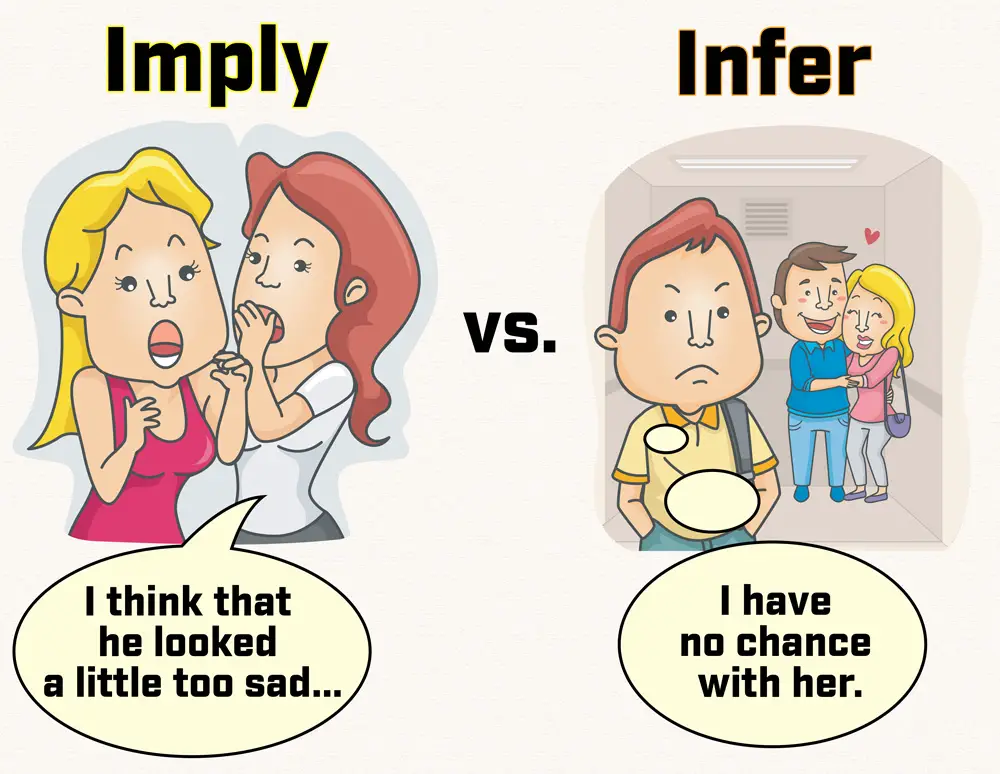Imply vs Infer
What is the difference?
Imply and infer are two commonly confused words in the English language.
Though they are used in similar, and even sometimes the same, contexts, imply and infer mean very different things. It can be easy to mix them up. Saying you implied something when you really inferred it is a mistake even native English speakers make. However, with a little work, you will be sure to never mix them up again.

Let's take a look at a few examples to help you understand the difference.
Click Here for Step-by-Step Rules, Stories and Exercises to Practice All English Tenses
Imply
Imply is a verb. It means to say something indirectly. When you imply something, you are saying it without actually saying it.
Examples:
- Joe's boss implied that he was going to fire him.
(Joe's boss said he was going to fire him, without explicitly stating he was going to fire him.)

- Even though he says he is happy, his expression implies that he is lying.
(He says directly that he's happy, but his frown says indirectly that he isn't telling the truth.)

- When Jon's wife said, "You're home late again," he knew she was implying that he was cheating on her.
(Instead of accusing him of cheating directly, Jon's wife commented on how often he came home late from work.)

- The newspaper implies that the senator is taking bribes because they do not have enough evidence to directly accuse him yet.
(The newspaper hints indirectly that the senator is taking bribes to avoid accusing him directly without enough evidence to prove their claim.)

Infer
Infer is also a verb. It means to reach a conclusion based on evidence. When you infer something, you are like a detective bringing together clues.
Examples:
- When Joe's boss calls him into his office, he infers from his angry tone that he's in trouble.
(Based on the evidence of his boss' temper, Joe reaches the conclusion that he's in trouble.)

- He told me he was happy, but I infer that he was lying based on his frown.
(I reach the conclusion that he was lying about being happy based on his expression.)

- When Jon started coming home late and lying about where he had been, his wife inferred that he was cheating on her.
(Jon's wife used his strange behavior as evidence to reach the conclusion that he was cheating on her.)

- Based on the evidence in the article, I inferred that the senator was taking bribes.
(Based on evidence presented in the newspaper article, it was easy to conclude that the senator was taking bribes, even though the paper never explicitly stated it.)

Tips
As you may have noticed above, the examples for each word are about the same situations. For example, Example 1 for infer and imply is about Joe's job. This demonstrates how imply and infer often apply to the same situation. This is why it is so easy to get them mixed up.
Usually, but not always, when somebody implies something, you have to infer what they mean. Since they don't state what they mean directly, you have to put together the indirect evidence of what they say to reach the conclusion of what they actually mean.
Remember: a person who implies is giving information, while a person who infers is receiving information.
A Story to Practice Imply vs. Infer
When Aaron's mom says, "Are you really bringing your guitar with you?" he infers that she is implying that he needs to focus on his schoolwork. This isn't the only piece of evidence he uses to infer what she really means. Lately, she has spent a lot of time implying that Aaron spends too much time playing his guitar.
She never comes out and says it directly. Instead, Aaron infers it from the way she says, "Most musicians don't make any money," or, "Is there going to be a question about rock music on your geology exam next week?"
Sometimes she doesn't even open her mouth to imply that he's wasting his time. Last week, she filled his guitar case with books. It didn't take much effort for Aaron to infer what she meant by that.
Sometimes, Aaron's mother wonders if implying how she feels is a bad idea. She worries that maybe Aaron is inferring the wrong lessons. She doesn't want him to infer that she doesn't like his music. She tries to think of a way to imply that she likes his music, but still wants him to study, but nothing comes to mind.
Instead, she sits him down and tells him exactly how she feels, without implying anything, so there is nothing for him to infer or misunderstand.
Quiz
Answer the following 10 questions and then check your answers. Each question is worth 10 points.
Part 1
- Which of the following is a correct definition of imply?
- To state directly
- To state indirectly
- To misunderstand
- To reach a conclusion based on evidence
- Which of the following is a correct definition of infer?
- To state indirectly
- To reach a conclusion based on evidence
- To communicate without words
- To work as a detective
- Which sentence is written correctly?
- She inferred that she was upset, but didn't want to say it out loud.
- I implied that I understood how she was feeling, because I could tell she didn't want to talk about it.
- She implies that I understand her feelings, based on our conversation.
- I infer to her that I am always willing to talk to her.
Part 2:
- Which of the following is true?
- Both infer and imply are adverbs
- Infer is an adverb; imply is a verb
- Imply is an adverb; infer is a verb
- Both imply and infer are verbs
- Which of the following is true?
- When someone infers something, they are giving information.
- When someone implies something, they are receiving information.
- When someone infers something, they are receiving information.
- None of the above are true
- Which of the following is true?
- Infer and imply can always apply to the same situation.
- Infer and imply mean the same thing.
- Infer and imply often both apply to the same situation.
- All of the above are true.
Part 3:
- Based on the tone of her voice, I can _________ that she's mad at me.
- imply
- infer
- implies
- infers
- He is afraid to say it directly, so instead he _________ it.
- infers
- inferred
- implies
- implied
- The man _________ that he is upset by telling people he wants to be alone.
- infers
- infer
- imply
- implies
- I always _________ the wrong things because I'm so bad at understanding the information I gather.
- imply
- implies
- infers
- infer
Answer Key
1. B | 2. B | 3. B | 1. D | 2. C | 3. C | 1. B | 2. C | 3. D | 4. D
Get Updates, Special Offers, and English Resources
Download your FREE GIFT (the first two chapters of
English Short Stories Book and Workbook)
as soon as you join!

By submitting your email, you consent to receiving updates and newsletters from us and to the sharing of your personal data with third parties for the purposes of sending you communications. We will not spam you. You can unsubscribe at any time. For more information, please see our privacy policy.





